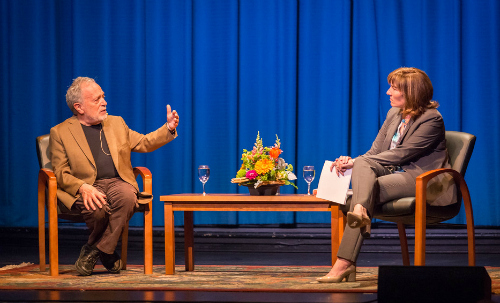Campus News
Reich delivers stinging indictment of ‘crony’ capitalism
Former U.S. Secretary of Labor Robert Reich discussed the problems of contemporary capitalism and politics before a full house at the Rio Theatre Tuesday (April 5), an event hosted by the UC Santa Cruz Blum Center for Poverty, Social Enterprise and Participatory Governance.

Former U.S. Secretary of Labor Robert Reich discussed the problems of contemporary capitalism and politics before a full house at the Rio Theatre Tuesday (April 5), an event hosted by the UC Santa Cruz Blum Center for Poverty, Social Enterprise and Participatory Governance.
In a lively conversation with Heather Bullock, a UCSC psychology professor and incoming director of the Blum Center, Reich questioned the role government really plays when big business mixes with politics.
Reich shared his thoughts on topics ranging from campaign finance reform to income inequality, a shrinking middle class, raising the minimum wage, and the student loan crisis. An ardent Bernie Sanders supporter, Reich served as labor secretary to President Bill Clinton from 1993-1997, and said he’s known Hillary Clinton since she was 19. He even revealed he once dated Mrs. Clinton when she was a Wellesley student.
Reich’s latest book, Saving Capitalism: For the Many, Not the Few (Knopf, 2015) formed the basis of the discussion. In his book, Reich discusses the increased concentration of political and economic influence of corporate and financial executives. He argues that, by and large, the economy and government is controlled by large corporations, Wall Street, and select individuals–the 1 percent.
“Political power shapes laws to protect proprietaries,” Reich said. Extensive lobbying by corporations with financial interest has resulted in governments working for businesses not people, he said.
The result? Wealth is redistributed upwards from the lower and middle classes to the top. The middle class flattens as financial access is widened for the wealthy.
Reich urged the friendly and supportive audience to “get out of our bubble.”
He argued that learning occurs from having conversations with people of different perspectives. Learning is about disagreeing with someone, he said, and advocated for more bipartisan dialogue not just in local communities but on Capitol Hill as well.
“The nation needs two responsible parties (maybe three) to govern,” he said.
For his book tour to promote Saving Capitalism, Reich said he asked his publisher to send him to conservative states in part so he could listen to residents to understand both sides of the same problem: “crony” or “rigged” capitalism made visible during bank bailouts of 2008 and 2009.
He argued that two popular movements from opposite sides of the political spectrum, Occupy Wall Street and the Tea Party, emerged out of the financial crisis. They share the same lineage, he said, and have led to the presidential candidacies of Bernie Sanders and Donald Trump.
Reich is now a professor of public policy at UC Berkeley. He is also a trustee and senior fellow for the Blum Center for Developing Economies, a network of interdisciplinary hubs at UC campuses focused on understanding global poverty and inequality.